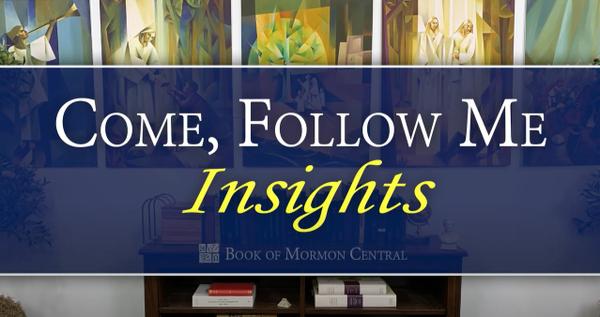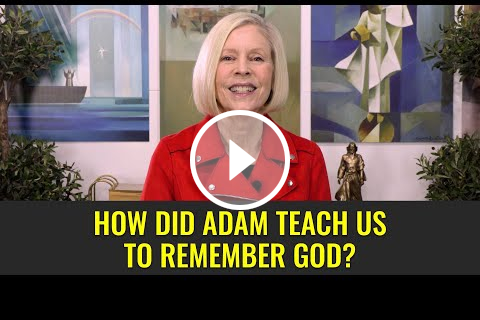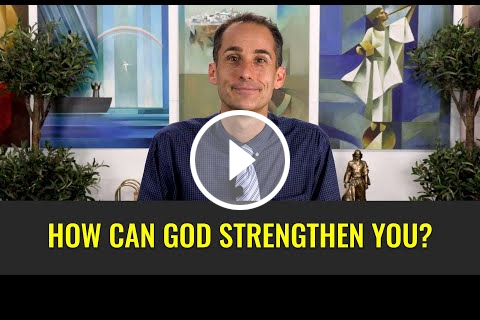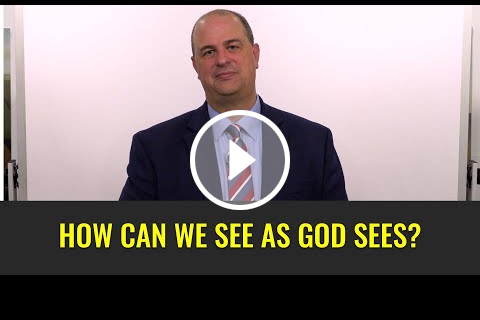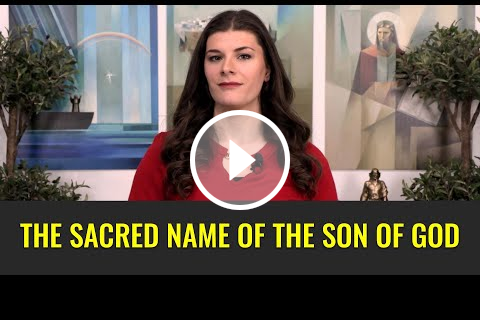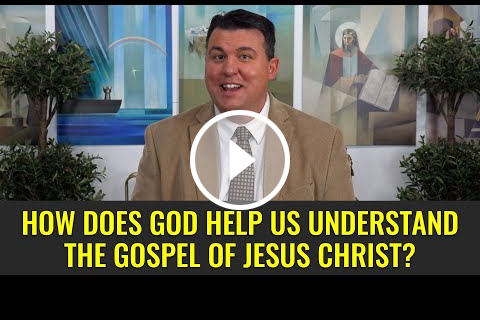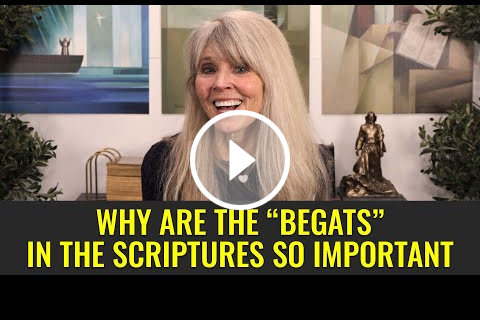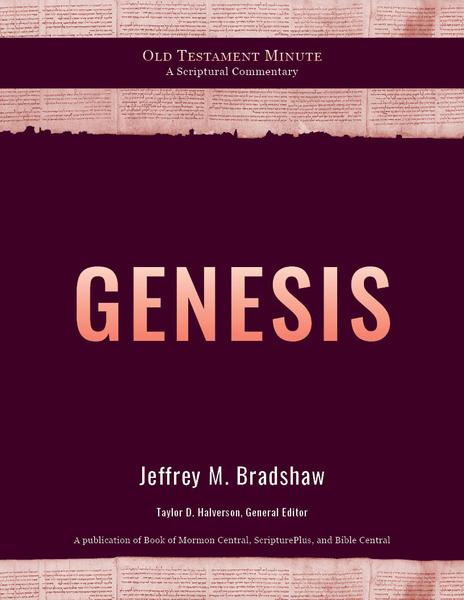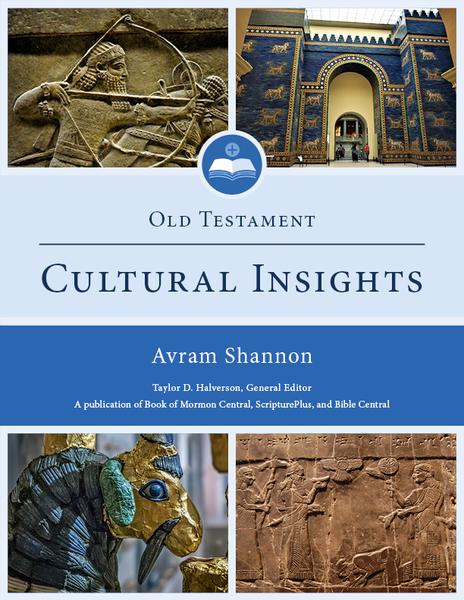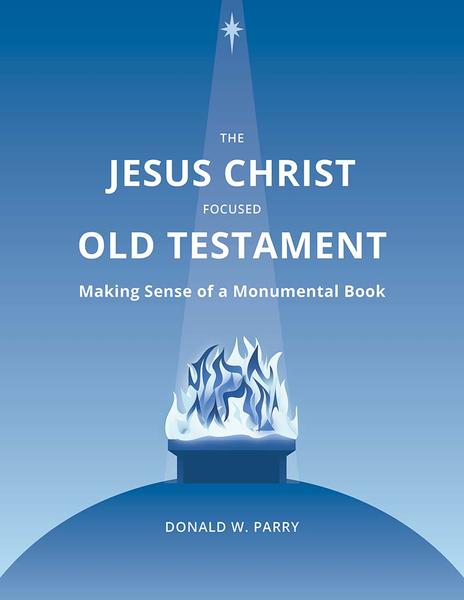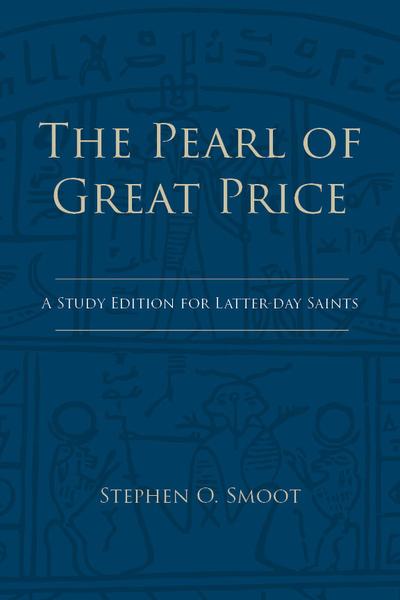|
Here is your Come, Follow Me resource guide for Genesis 5; Moses 6. Some highlights this week are:
You can find this week’s reading plan and study guide here. Or, download the ScripturePlus app for a guided reading plan and additional resources.
|
Book and Chapter Resources
|
|
Come Follow Me Insights
This week, Taylor and Tyler discuss the importance of genealogical records, Enoch’s calling from the Lord, and the difference between justification and sanctification.
|
Jan 17-23 (Genesis 5; Moses 6) Come Follow Me Insights with Taylor and Tyler – powered by Happy Scribe
I’m Taylor and I’m Tyler.
This is the Book of Mormon Central’s Come Follow Me Insights.
Today. Genesis five and Moses six.
This is it’s kind of fun because we only have one chapter in the Bible, one chapter in the Pearl. Great price. We’re going to spend all of our time subsequently in Moses chapter six. And we’ll just point out some of those major sections that are added. But we’re actually going to have some time today to dive in in the second half of chapter six and go verse by verse, by verse. So to begin, it’s fascinating to see that this chapter, you’re going to get the history of Enoch, his call to be a Prophet, and some of his interactions with the people and some visions that he had that he shares with one man and probably some others in the group. But it’s really a profound chapter and it’s got some deep doctrines in it that are are extremely applicable today to helping us move forward on the Covenant path. So let’s dive right in. In verse two, you’ll notice Seth is born to Adam and Eve and they are so excited for this new baby to be born. You’ll notice at the second half of verse two, it says, God has appointed me another seed instead of Able, whom Cain slew.
And then in verse three, which is a Joseph Smith translation edition that is not in the biblical account. There are quite a few of these. Throughout this chapter, God revealed himself unto Seth and he rebelled not, but offered an acceptable sacrifice like unto his brother Abel. So that sentence right there is a JST addition to the Moses account. Fascinating that Adam and Eve, as this little baby is born and then grows and he gets this connection with God. How that must have given peace and comfort to these parents, Adam and Eve. Sometimes we only look at the infinite atonement of Jesus Christ as this force for helping people overcome sin. But it’s important to note that Adam and Eve, 4000 years before Jesus is even going to be born, are in desperate need of the Grace that comes from the Savior’s infinite sacrifice for millennia down the road and how powerfully they are able to heal and move forward in faith in the Savior, even in spite of all of the things that have happened in their family that are very difficult. Cain slaying, able, and then many of their other children before that harkening to the voice of the devil.
So isn’t it heartening that even if you aren’t the one committing major serious sin, the reality is there are ripple effects that go out from every wrongdoing and sometimes those ripple effects negatively impact other people. And if you’ve committed sin that’s affected others or if you’ve been affected by people who have committed sin, either way, we need the infinite mercy, love and Grace of Jesus Christ that flows into our life through the power of his infinite atonement just as much. And I think that’s a powerful reminder to us right out of the shoot. And you’ll notice also right here in the beginning part where they describe language. Language is such an interesting thing back when Adam and Eve come out of the Garden of Eden. Apparently based on what we read here, look at verse six by them. Their children were taught to read and write, having a language which was pure and undefiled. We usually refer to this language as the A DAMIC language, this perfect, pure language. And if you look at verse five, they had a book of remembrance that was kept which was recorded all the things that God has given them to write by the spirit of inspiration.
And isn’t it fascinating that through the history of time, often the written form of language is created in a way to try to encapsulate what God has given different cultures, different Nations, Peoples at different times, that often that’s the driving force to get things written down. English, what was our first and most widely published book in the history of the English language, by far, the Bible, and thus it is in many other languages, is people trying to encapsulate the spiritual. So that’s why they’re learning these written languages. And it seems to have been that way from the very beginning. The language was written down so they could take the things that had been inspired by God.
And of course, Jesus is called the word of God, and we get the truth conveyed to us through words. Of course, there are many ways to convey truth through art and literature, singing beautiful landscapes. But words are these powerful ways of helping people access God. And just for fun, the inspired writers of the Scriptures actually used the language very creatively for the original people to understand and remember key lessons. If we go back to the first couple of verses, the word Seth in Hebrew actually means somebody who’s been appointed. So it’s interesting how you have this son of Adam named Seth. And Adam says, because God hath appointed me another seed. Actually, you’d use the word Seth there where it says appointed, even the word Enos, it means man. What man are we talking about? Well, it could be men you actually have in verse four and then began these men to call upon the name of the Lord. And so when you remember Enos, you’re like he was a man, and a real man or woman calls upon the name of the Lord. So these little workplace go on to invite us to remember that God is the one who appoints us in our place.
Like Seth, God is the one who’s the real man. And if we want to be real people, we call upon the name of the Lord, just like Enos did. So these little things that go on in the text and the underlying language that are kind of fun.
Beautiful. So you’ll notice that starting in verse 13, it mentions Seth, verse 17, Enos, verse 19. Canaan 20. Mahalilu, 21. Jared. And then Jared becomes the father of Enoch in that verse. So you get all of this line of father to son coming down from Seth, who’s the son of Adam and Eve, all the way down to Enoch. I think that’s fascinating when you look at many scriptures where they tell the story, whether it’s the New Testament in Matthew, in his account, it starts with a long list of genealogy. In the Book of Ether, you get the very opening chapter starts with a long list of 31 generations of different prophets and Kings and leaders among the Judites. The Book of Luke has a long genealogy list, and there are many genealogy lists that show up throughout different places in the Old Testament. So why do we care? What difference does it make? Keep in mind, we live in a very Westernized Greek cultural setting in our world today, most of us, at least in the Western part of the world and to a large degree in many parts of the Eastern continents of the world, where we are very individualistic, where our identity is very about the one.
It’s like something we create. How many times do we hear about people creating their own brand or their own identity and their social media accounts? And often people want to go find themselves by leaving family or home or even Church. They want to create their own identity. And I think where you’re going here is that for much of human society, your identity was wrapped up in family. And ultimately, if you follow these genealogies back, it’s ultimately God’s family. He’s the one who plays there you go.
That’s it. So heavenly parents are in charge of this whole human family. Adam and Eve are the first created in their likeness and image on the Earth, and we all tie back into them. And you’ll notice in the Gospel of Jesus Christ, to be sure, there’s plenty of opportunities for individualized identity, but the overall work of Salvation in the Gospel of Jesus Christ is found in the collective. It’s in belonging to the group or in this case, the family, the house of Israel. So that your genealogy ties right into this genealogy. Those pedigree charts were a big deal to people in antiquity, whereas often today we read them and we get bored reading them.
Yeah. I don’t think you and I have ever actually shared four generation charts before.
No.
But you go to the Middle East today, like to an Arab family. It’s one of the first things they want to do is recite their genealogy as far back as they can go. Traditional Chinese culture and society, same thing. It’s absolutely fascinating. And sometimes I get a little it’s called divine envy, a little jealous, like, wow, I wish I could memorize back as far as I could go, yeah, it’s beautiful.
Just as a side note, it’s obvious that there are many people with exceptions to this capacity to be able to have a family and generations. There are a variety of things that can prevent that from happening. However, we live in a world where the devil is doing everything he can to make family and posterity become as negative and as not desirable as possible in our culture today, which is so fascinating because you read the proclamation to the world on the family. And this is the means whereby God carries forth his plan of Salvation for his children. And we’ve realized there are going to be exceptions, but it’s almost as if the Devil’s trying to make the exception become the rule for more people. So just pointing that out as we jump in to Enix story that it isn’t far from Enoch’s mind. His roots all the way back to Adam and Eve and then subsequently to God. He’s very aware of his identity not as an individual, but as a link in a very long chain that’s going to go to the end of the world based on the vision that he has here.
Let me actually add two things here. One is, if you take the story of Jesus, his story is not technically ideal from a family situation is that he’s adopted and actually ends up becoming this beautiful thing where he’s adopted by Joseph, he’s got a heavenly birthday, but he doesn’t fit the prototypical ideal scenario of a family. And even Jesus shows that. Look, ultimately it’s about are you centered on God and his family, even if your earthly family doesn’t fit the so called whatever, if that’s even out there, the ideal, perfect ideal. And as we move into Enoch, I want to throw out one thing here about his name that makes this whole story so fascinating and how it actually can relate to all of us. Because I don’t know about you guys. When I read the Enos story, I’m like, I’ll never be like him, and I’m not really sure that’s the whole point for all of us to have the same exact experience as Enoch. And yet, like we saw a few sessions ago, the story that Moses has individually God Moses represents the every person that we can see ourselves in Moses that we too can learn our identity as a child of God.
Enoch is something similar. Enos in Hebrew means dedicated or consecrated. Now, you might be familiar with the Jewish festival of Hanukkah, where they dedicated or consecrated olive oil. They let the menorah so they could actually dedicate the temple. And the word Hanukkah comes from the same word for Enoch. Why did I bring this up? Well, we’re going to see how Enoch, through the help of God, dedicated and consecrated his life to spread God’s Kingdom throughout the world, or at least within his realm. So maybe you’re not 65 and feeling like a lad that is unable to speak the truth wherever you might be in your life, you can be dedicated to God. You can be consecrated to his work. If you have taken the baptismal Covenant, that is a form of consecration. You are an Enoch. If you have partaked the Sacrament and you dedicate yourself to God and promise that you want to live his Covenant path, you are dedicating and consecrating yourself. You are an Enoch. So as you listen to the story, let’s glory in amazing experiences that the Prophet Enoch had. And let’s listen to how can we follow his example to be more consecrated and dedicated to God in his work?
Let’s pick up his story. Now in verse 25, Enoch lived 65 years and begat Methuselah once again. There’s that old Riddle who’s the oldest person ever recorded in the history of the Bible. And yet he died before his father did. And the answer is Methuselah lived to be 969 years old, the oldest person we have a record of in the Bible. But he died before his father did because his father’s Enoch and his dad never died. He’s going to get translated. So here we get on the timeline. Enoch is born of Jared. He’s now 65 years old. When perfect time to retire.
And now it’s time just to time to relax.
Unless you’re living in a society that lives to be 900 plus years old, you’re just barely getting going here. Right? So that is the timestamp that we get in the JST version of Genesis five, because keep in mind most of what we read in the rest of Moses six is not contained in the biblical account. So these are prophetic editions by the Prophet Joseph. And so the only timestamp we get is 65 years old when Methuselah, his son is born sometime after that point, we assume, is when this event occurs. So we assume he’s at least 65 and maybe a little bit older. Verse 26, it came to Pasadena, journeyed in the land, among the people. And as he journeyed, the Spirit of God descended out of heaven and abode upon him. I love that concept of he’s journeying among the people when the Spirit of the Lord came and abode among him. He hasn’t been called to be a Prophet. That’s what’s going to happen here. But the principle to me is a fascinating one that I believe I first remember hearing this concept from President Thomas S. Monsoon. I’m sure there might have been other people before him who talked about it or who demonstrated it or modeled it.
But President Mormon was a big fan of this idea of if you’re seeking Revelation, for instance, where to put a temple in East Germany, he said, I feel like I need to go to East Germany and be there for that inspiration to come, rather than trying to get that inspiration from the confines of his office in Salt Lake. Or if you’re seeking inspiration for a ministering family at a more local level, rather than praying about that family in my home or a Church in a meeting, talking about ministering, what a difference it makes to go and stand on their front door, even if I have no idea what to say or what they need. But to go and be among them. That principle is so powerful in leadership, in parenting, in teaching is to go and be among the people that you’re praying for. I believe that we’re far more likely to get that inspiration and that revelation when we’re with them, breathing their air, walking their soil with them.
It’s an interesting contrast. He’s out journeying, and the Spirit abode with him. Abode means you’re not moving, you’re steadfast.
It’s a dwelling place.
Yeah. And actually, while Enix in movement, the Spirit has a place to be centered.
That’s so beautiful. When you open your heart and your mind to say to Heavenly Father, I need help and I’m opening. I can’t force it. I can’t push a button and say, Now I’m going to fill the Holy Ghost. All I can do is open myself to the best capacities. I have to say, Teach me. I don’t have this figured out. I don’t know all the right things to say or do, but teach me. It’s beautiful. Then, as that Holy Ghost, like you said, abode with him. It has a home in his mind and in his heart to teach him as he goes around. So here’s the revelation that comes. Verse 27, he heard a voice from heaven saying, Enoch, my son, by the way, I love that idea of it’s. Not Enoch, my servant, or Enoch, even my friend, is as wonderful as that phrase is. And we’ve celebrated that in other places in scriptures. It’s a different thing when you hear the voice of God saying, My son or my daughter. In this case, he says, Enoch, my son, prophesy unto these people and say unto them, Repent. For thus saith the Lord, I am angry with his people and my fierce angers kindled against them.
For their hearts have waxed hard, their ears are dull of hearing, and their eyes cannot see afar off. Did you notice what just happened? God is using parts of the body to teach amazing principles about discipleship and following him on the Covenant path. So you have the hearts, ears and eyes. Their hearts, he describes, have waxed hard. And if a heart is hard, it’s pretty hard for the Holy Ghost to penetrate that rock border that we sometimes set up around our heart, because he doesn’t usually come yelling and shaking the Earth. There have been exceptions to that, but usually it’s a still small voice. And so the heart can’t feel that truth descending anymore. The ears, they’ve become hard of hearing, dole of hearing. Fascinating in this world of ours that has such a high volume of noise that’s constantly trying to make its way into our mind with our phones. It doesn’t have to be an audible thing. There’s so much noise that can come in to our minds through these sources, which make it harder to hear that still small voice. And then the eyes have become blinded. They cannot see a far off, which means they’re myopic.
We can see what’s right here, right now, but we’re not making decisions based on the long view. We’re basing all of our decisions on. What do I want right here, right now? That’s kind of the definition of myopia right where we can’t see afar off, which makes us far more likely to give in to the temptations of the devil. Isn’t that fascinating? That what you got right there from the Lord to Enoch in his prophetic call was, this is what the people have done. And now what a Prophet’s calling is, is to reverse that. It’s to help soften hearts. It’s to open ears so that you can hear him speaking to you. It’s to open eyes, not just for the me here now, but for the long view going forward, and the long view going backward in all directions, which is the opposite of what’s happened with these people, is what Enoch is going to be called to be, which is a sear. I once heard Michael Wilcox described this very beautifully and very simply as a sear is a CER. They just see very clearly, and that’s what profits are helping us to do.
So some would say, well, Tyler, you just follow the profit because you’ve got blind faith. And my response is, no, I don’t follow the Prophet because I have blind faith. I follow the prophets because they are seers. They do see things that I don’t see. They have a perspective that I’m not privy to. I don’t have that same view, and I follow them because I recognize my own limitations and I recognize their divine calling. And yes, I am absolutely going to trust what God gives us through prophets, seers, and Revelators, because I don’t trust completely myself to think that I can see things that they can’t. I don’t feel like I’m smarter than God’s. Prophets and the scriptures are full of examples of people who did think that they were wiser, that they could see more clearly, they could hear more distinctly, and that they could feel more than what God’s prophets saw, felt, and heard. And those stories don’t usually end very well.
All of these things are tied into what we might use in our world, the word attention. And our world wants our attention. It’s very valuable to them, and it should be valuable to us. The word for attention actually literally means to hold. And we’ve talked before that God holds us in his heart, and he wants to hold our attention. And so if we have turned our attention to other things and the world has held us, it’s very hard to be held by God. And so all this attention here is where are your heart, ears and eyes? What’s the attention? What’s holding their interest in time? And I think that if we let God hold our eyes, ears and hearts, we’d find that we’d have a lot more peace and happiness.
That is such a beautiful concept because the idea is we sometimes put all of our focus on what we’re doing here. But let’s remember that it’s God who first loved us long before we were capable of loving Him. It’s God who is the best listener in the whole universe, and he will listen to anything you have to say to Him, whether it’s celebratory or whether it’s frustrations or whether it’s anger. There’s no better place to go than to he who will listen to you as long as you are willing to talk to him. And there’s nobody who sees you more clearly than God. So isn’t it fascinating that as he tries to get us to soften and open our eyes, ears and hearts all it is, at the end of the day, all it is as an invitation to reciprocate just a little bit of what he already gives to us in infinite proportions, in abundance. It’s at the end of the day, an invitation to become a little more like him, a little more like the Savior in how we look to God, and by default, than how we will look to other people. We will take on more and more of those attributes of the divine where we see people more the way heaven sees them.
I love this introduction to his prophetic call. The reason I love it is because sometimes if we’re not careful, we’ll only focus on the seemingly negative parts of the call where he’s saying, I’m angry and my fierce anger is kindled against them. But then you get this part where he’s describing their struggles. And the whole reason he’s calling a Prophet isn’t to go and destroy them. It’s to prevent them from being destroyed. It’s to prevent them from continuing down that self destructive path that they found themselves on. So then jump down to verse 429, Wherefore they have foresworn themselves and by their oath, they have brought upon themselves death. And the hell have I prepared for them if they repent? Not now. I don’t know about you, but if I were in Enix shoes, at least 65 years old, we assume, and you’re getting this call and God’s pointing to this city, this group of people, to go and share that message with them. I could be wrong, but I don’t think many of you in this audience would be saying, oh, please, sign me up. I would love that.
Well, especially it says these people in their abominations, they have devised murder.
Murder.
That’s what they’re focusing on. Which, by the way, just for fun, the word murder is the same root word that we find in the word Mort, like mortuary or mortgage. It’s literally a death pledge. You’re pledging your life to the bank, you’re going to pay back that money. But it’s all about death. And who’s the only person who can really bring death? And look at what God says. They have not kept the Commandments verse 29. They have forcewawn themselves, and by their oath, they have brought upon themselves death. God is a God of life. And when humans try to do the exact opposite of bringing death to the world, that is the exact opposite of what God wants. And I think it’s fascinating that Enoch is told to go among all these people who are devising death. When I was sent on a mission, my mission call did not say, by the way, you’re going to go among a bunch of people who really get kicks and grins out of causing murder in mayhem. Okay. I went among some really amazing people.
Most parents wouldn’t send their children on such mission.
Most parents.
Most parents.
Depends what kind of child is. My parents may have been happy to send me along. So Enix faith and faithfulness here is really beautiful that he fully. Well, he learns to fully trust God in this call.
Yes. So here’s the response from Enoch to that call. You can picture that moment when God delivers the divine mandate. The Commission, if you will. I want you to go and do this. And then there’s this moment of response, a reaction from this Prophet. I love Enoch’s response. You’ll find it in verse 31. And when Enos had heard these words, he bowed himself to the Earth before the Lord. So you can picture this. It’s not a defiant position. He’s not standing up to the Lord saying, no way, I’m not doing this. He’s very humble. He bows to the Earth before the Lord. So it’s not just falling to the Earth out of exhaustion. It’s a very Worshipful bowing that’s going on here. And then he says this, why is it that I have found favor in thy sight? And then he’s going to give three reasons why he should not have been the one to be called to do this prophetic mission. Number one, I am but a lad. I am way too young to be a Prophet. I can’t do this. Number two, all the people hate me. I’m not very popular. Nobody likes me.
Number three, for I am slow of speech. We don’t know for sure based on scriptural accounts, what he means by that, what kind of a speech impediment or if it’s a stutter, or if he’s not very good with the language that’s needed with that people.
He might be not very eloquent. He might be kind of boring to listen to you.
Yeah, here’s the point, brothers and sisters, we do not worship a God who would look at Enoch in that moment and say something like, you’re right. You are a little bit too young, and you aren’t very popular. Are you? And I hadn’t noticed that speech struggle that you have. Never mind. I’m going to go find somebody better qualified than you. Sorry to interrupt your day back to what you were doing. That is not the God that you and I worship, nor on the other extreme, do we worship the kind of a God who would look at Ena can say, seriously, those are the only three things you think that disqualify you from being the Prophet. Let me give you a long list of why you really aren’t qualified to be a Prophet right now. We don’t worship that kind of a God either. I love with all my heart. I love the God that we worship who listens to Enix concerns. And he doesn’t just dismiss them and he doesn’t treat them flippantly. He listens to them. And then look at what he says. Verse 32 and the Lord said unto Enoch, Go forth and do as I have commanded thee, and no man shall Pierce thee.
Open thy mouth and it shall be filled. And I will give the utterance notice. I will give thee utterance. For all flesh is in mine hands, in my hands, and I will do as Seamoth me good. Enoch, this isn’t about you alone. This is about you being willing to go and do my will. I’m going to do my work through you, and I’ll make all of this workable. You don’t need to worry about that. For those of you who have ever received a Church calling that felt just a little bit overwhelming, or you felt completely underprepared or out of your League, so to speak, you can relate to Enoch here. And this isn’t just for Church callings. This could be for relational situations going into marriage, you may feel like, I can’t do it. I’m not good enough. I don’t have the skills or the necessary elements to be able to be really successful here. Then this story could be for you saying, as long as you’re walking with the Savior, you’re going to be on his errand, you’re going to be doing and learning and producing things that he wants you to learn and develop and produce in the process.
And it’s beautiful. And for some of you, this could have to do with health challenges for you or a loved one. You might be saying, no, I can’t do this. I’m not capable of this at this point in my life where I don’t have the right skill set to be able to deal with this particular trial at this point. And I love those words from the Lord. I hope we can hear them echoing whenever we find ourselves in a similar situation. Go forth and do as I have commanded thee, and no man shall Pierce thee to me. This is a beautiful way of the Lord saying, Be still and know that I am God. To quote Doctrine in Covenant, section 101, verse 16. It’s that just trust me. I know what I’m doing. And then he takes it one step further. This is amazing. Verse 33. Say unto this people, Choose Ye this day to serve the Lord God who made you. Don’t you think that’s a little ironic? He’s saying, Go, your message to the people is, Choose Ye this day to serve the Lord God who made you. But in that message to the people, it was God’s message to Enoch.
Choose this day to serve the Lord God who made you. Enoch, you can do this.
This is where I see his name dedicated. He went and did.
Eventually we’ll see that he went and did, in spite of all of the opposition and the setbacks that he felt like disqualified him for this calling. Wherefore am I, thy servant? Why’d you pick me? I can’t do this.
So he consecrated himself to God. Whatever he had to offer.
That’S what he brought. He gave it all. And now, one of my favorite verses of all scripture anywhere. It’s on my shortlist of five favorite verses. Verse 34. Behold, my spirit is upon you. You’ve probably heard that old saying, Two people can accomplish anything as long as one of them is the Lord. Behold, my spirit is upon you Wherefore all thy words will I justify. And the mountains shall flee before you, and the Rivers shall turn from their course. And thou shalt abide in me. And I in you. Therefore, walk with me. Those three words right? There are three of my favorite words in all of scripture, in all of anything ever written. When the Lord gives that invitation, walk with me. That is so empowering for those of us who recognize very well our imperfections and our fallen nature. It’s such an amazing thing to have a God who understands us and who doesn’t say, Go, good luck, and I hope you succeed. Have a good journey. I’m so grateful to worship a God that says, I have a work to do, and I’m inviting you to come and walk with me as we do this work together.
I love that phrase. And when I went out into the mission field to serve down in Brazil, I felt like less than a lad. I felt like nobody loved me. And I was less than slow speech in Portuguese. But I felt this quiet, steady confidence that can come only from heaven as the Savior reassures that young version Elder Griffin, to go out into the field, walk with me. I felt that when I came home and started College at Utah State University feeling like I wasn’t going to be very good at that. But it’s that invitation. Walk with me. I felt that when I went into marriage with my Angel, I don’t have it all figured out. I don’t know how to be a great husband or a good father, but it’s that feeling of, Walk with me. And then those children, we were blessed to have some children born to us. And I had that feeling of what did we get ourselves into once again? Walk with me. This phrase has blessed my life. So Mary times over and over and over again. And it does to this day because I recognize that it’s not about me.
It’s about connecting with Christ, walking with Him, and we know what path he walks on. It’s called the Covenant path. And any calling or any health concern or any mission or any relation that you need to enter into, you walk with Him. And he more than fills in our inadequacies and our imperfections and makes that a glorious experience. Moving forward on his Covenant path.
This phrase is covenantal. We’ve talked before about the Covenant path. God wants our loyalty. So when you see this, God really just wants us to be with Him, loyally with Him. Every week you can show your loyalty to God by partaking of the Sacrament. We might also call your attention and reminder that back in the time of Nephi, he saw this vision of the tree of life. Both his Father and he saw this vision where people sought to walk with God. They held to the Rod. They pressed forward in the midst of darkness, not always knowing where things were going. They had this hope and belief that they would get to Jesus. And this is like in our lives, we hold onto that iron Rod even though the myths of the world tried to distract us and take our attention away from things that matter. As long as we regularly show to God that we are loyal, that we are with Him, he will be with us. It’s hard at times, but God is a God of simplicity. He simply wants to be in a loving, covenantal relationship with us. Show it to Him. Declare every day I’m yours, God.
Beautiful.
Now look at verse 35. When the Lord speak unto Enos, consider unto him anoint thine eyes with clay and wash them and thou shalt see. And he did so that is so fascinating for some of you, you’re probably thinking, Wait, that sounds really familiar to the story. In John chapter nine, the blind man at the gate of the temple who’s begging who Jesus, spits on the ground, makes spittle clay and puts that clay into the blind man’s eyes and says, Go to the pool of Silom, which means scent. So he sent him to the pool called scent. Go down there and wash your eyes with water.
I find this a crazy story. It’s an awesome story. But if you wanted to blind somebody, one of the fastest ways to blind somebody is to shove your thumbs in their eyes. And actually, if it’s full of dirt and you rub it in, that’d be the way to do it. Oh, and by the way, if you’re in Jerusalem, the Temple is the high spot. The pool salon is the lowest spot in the city. And I’m exaggerating a bit, but it’s almost like Jesus sent a blind man on his own journey over a cliff. It doesn’t sound like what Jesus would do, but what is he wanting this blind man to do is to exercise faith. Trust. Here is Enoch, and we learn that the people can’t see, and God covers Enoch’s eyes with the created world, and then Enoch really can see. So there’s all these kind of unexpected ironies that God uses to teach us. And he does this at times to get our attention. So we pay attention to important things about his character.
Isn’t that beautiful that he’s using the dust of the Earth out of which he was created to cover his eyes? If you want to talk about a myopic situation, like Taylor was saying, just cover your eyes with clay and then that follow up is and wash them. So then we wash them. I don’t know what it means to you, and it can mean a variety of things to different people at different times, but to me, it’s this beautiful object lesson that God has given Enoch to say, you can take the things of the world and fill your eyes with them, and it will make it so you can’t see afar off. But if you wash them, that symbolism of water and the washing away of the impurities of this Earth, water being this symbol that comes down the Dews and the rains that fall from heaven, that washes away all of the blindness and the sorrow and the struggles and the toils and the pains of this dust mortal experience. And now you can see things before you couldn’t see, which, by the way, is an interesting aspect for me of this whole notion of having faith in Christ.
Because what is faith? One of the scriptural definitions is to believe in things which are not seen, which are true, which means you have to move forward in faith. Like Taylor was talking from the tree of Life dream, where sometimes it’s really dark and you can’t see, but you move forward, holding continually fast to that iron Rod, knowing that the day will come when the Lord opens up our vision. And now we can see things that we never knew were possible before.
At Baptism, you are washed and consecrated as a member of the Church. As you have hands laid upon you and you’re given a command, receive the Holy Ghost, not, hey, you get to get to the Holy Ghost. It is receive, which means you have to act to let the Spirit into your life. So you are essentially consecrated or dedicated unto God in his name. At baptism, that’s how you get called a Christian. And then at the temple, before you receive your endowment, there is a washing and anointing where you are symbolically washed from the cares and concerns and the dirt of this world. And you are anointed with oil, consecrated to God so you can receive these divine gifts, what we call the symbolic clothing of God’s power. So I see this as like our own lives here, our own spiritual lives, that Enoch has been baptized or washed, and anointed it’s an invitation for us to remember that we need to do this on a regular basis.
And that’s going to come up here as we turn the page over in a minute. Notice that he could now behold spirits that God had created, and he also beheld things which were not visible to the natural eye. And from hence henceforth came to saying, Abroad in the land, a seer hath the Lord raised up unto his people. I love that he can see things that nobody else can see, and Consequently he can prophesy and make judgments on things that nobody else can see. Notice how they describe him. Bottom of verse 37. He’s testifying against their works, and all men were offended because of him. Isn’t that amazing? It’s as if they wanted a Prophet who was tame, a Prophet who would tell them, Good job, keep up the good work, don’t change anything. You’re great just exactly the way you are. That isn’t the role of most profits through the history of time. They don’t come down to tell us don’t change anything. They come down to get us to walk a higher road, a higher path, that Covenant path. Consequently, verse 38 tells us at the end that they’re going from their perspective to see a wild man have come among us.
They think it’s entertainment. They’re not even paying attention to the message.
He’s wild, which means you can’t control him. He’s not tame. You can’t make him say what you want him to say or do what you want him to do because he’s wild from their perspective. And then look at verse 39. It came to pass that when they heard him, no man laid hands on him for fear came on all of them that hurt him. Why? For he walked with God. There’s this something emanating from him that is causing all of them to say, well, we can mock him, we can laugh at him, we can make fun of him, but we can’t do anything to hurt him because something’s different about this guy. He walked with God. Isn’t that amazing? That when the Holy Ghost has an abiding place in our mind and in our heart, and when we’re connected with Christ covenantly, we move forward. No weapon formed against us will prosper ultimately. Now, that doesn’t always mean that every life is going to be spared physically on this life, because sometimes it doesn’t happen that way. It just means that God’s purposes are going to roll forward regardless of whatever anybody on Earth or in hell is doing to try to thwart that effort.
So now we shift gears in verse 40. So the rest of this chapter is going to be rooted in a conversation that Enos is having with a man by the name of Mahaja. So Mahaija comes and says, hey, just tell us plainly, who are you? Who art thou? And from whence Thou camest, we just don’t get you, you’re wild. And so Enos starts telling his story of who he is, where he came from, and what God’s done for him. And verse 43, and it continued his speech, saying, The Lord which spoke with me the same as the God of heaven. And he is my God and your God. And Ye are my brethren, why counsel Ye yourselves and deny the God of heaven? That is such a profound statement to set up the identity so clearly early on that he’s not just my God, he’s also your God. You just don’t know Him yet. And I’ll help you come to know Him. You’re my siblings, you’re my brothers. And we would say sisters as well. And let’s learn about our identity by learning about God and his identity. So then he jumps down to the creation part of the story, how God created the heavens and the Earth as his footstool.
And then look of verse 47 and as Enix baked forth the words of God, the people trembled and could not stand in his presence. These people who before hated him because he was slow of speech. Well apparently he’s not very slow of speech anymore. That doesn’t seem to be a big issue. And while the people may still not love him, it seems that they are at least now asking him the right kinds of questions. God is slowly starting to help them open their hearts. Look at verse 48 and he said unto them, Because that Adam fell, we are, and by his fall came death, and we are made partakers of misery and woe. So he’s now teaching this human condition through the doctrine of the Fall. And then he starts talking about how Satan has come and tempted them. And God gave the command verse 50 that all men must repent. Now if you jump down to 52, it says, and he also said unto him, if thou wilt turn unto me. Now in an Old Testament Hebrew context, the word repent actually is rooted directly into the word turn.
Really interesting. The word in Hebrew shoes means to turn or return. And the word in Hebrew for sin actually means is Hata, which means to miss the Mark. It’s almost like you have you’re in archery and you’re shooting and if you ever miss, you just turn and reaim. It’s very interesting. God is saying, just Reame yourself and shoot again. And if you miss, repent or turn or reaim and shoot again. So all these words here, repentance and turning are all about we have to act. God Himself will not force us to turn right. We have to make the choice to do it.
So notice he carries that motif forward if thou wilt turn unto me. So we turn towards the Mark. We’re not aiming away from him anymore. We’re turning to God. We may not be perfect in our execution, but our intent. God judges that intent. He celebrates that effort. He celebrates that wrestle that we have to turn harken unto my voice and believe and repent of all thy transgressions and be baptized even in water in the name of my only begotten Son, who is full of Grace and truth, which is Jesus Christ, the only name which shall be given under heaven, whereby Salvation shall come unto the children of men. Ye shall receive the gift of the Holy Ghost, asking all things in his name, and whatsoever you shall ask, it shall be given you. Did you notice we just got the gospel of Jesus Christ in one verse? It doesn’t show up in the Old Testament and it’s missing from the Genesis count. That is what I would classify as a plain and precious truth that is so sweet and so simple when it comes right down to it as Enos is laying this out. And then notice the question that is brought up in 53 and our Father Adam Spake unto the Lord and said, Why is it that men must repent and be baptized in water?
By the way, if you’re the first people out of the Garden of Eden and God says you have to repent and get baptized in that water, that might feel just a little bit odd to you like, Why do I need to do this? And Adam’s asking a sincere question, look at God’s answer. The Lord said unto Adam, Behold, I have forgiven thee thy transgression in the Garden of Eden. Did you notice that that answer doesn’t seem to directly respond to the question, Why do I need to repent and be baptized? Behold, Adam, I have forgiven thee thy transgression in the Garden of Eden. How is that an answer? Oh, I wonder if God is saying, Adam, you can’t keep blaming everything bad that happens in this life on the decision that you and Eve made to partake of the fruit back in Eden. I’ve already forgiven you of that transgression. It’s done. You’re not held hostage by that decision anymore. Therefore, you now have this period where you can learn and grow and experiment with this idea that Taylor is using of shooting towards the target. And if you miss, you keep recalibrating, you keep turning, and you keep moving forward to the best of your ability to keep hitting the Mark.
And verse 54 takes it one step further. Hence came the saying abroad among the people that the Son of God hath atoned for original guilt, wherein the sins of the parents cannot be answered upon the heads of the children, for they are whole from the foundation of the world. Oh, if only that verse had been included through the millennia in the Old Testament account, it would have saved us a whole myriad of doctrinal struggles. Not just in Christianity, but in the world at large of the nature of human beings. When we’re born, are we born into sin or we conceived in sin? And now look at how he describes it. In 55, the Lord speak unto Adam, saying, Inasmuch as thy children are conceived in sin, we’re born into this fallen celestial world, meaning the act of conception is not sinful, not sinful.
It’s just that the world we live in has fallen. The world is sinful.
So it’s an important designation that is very important. Even so, when they begin to grow up, sin conceiveth in their hearts and they taste the bitter that they may know to prize the good. Isn’t that fascinating? As we learn and grow and develop, we experience mortality so that we can distinguish the bitter from the sweet, the good from the evil. And now verse 56 says, and it gives us it is given unto them to know good from evil, Wherefore they are agents unto themselves. And I’ve given unto you another law and commandment. Did you notice that phrase? They’re agents under themselves. We are now agents. We are free to choose for ourselves. We can aim any direction we want, but there are always going to be consequences depending on any of those choices that we make. But we are agents. We’re no longer held hostage by previous decisions made by Adam and Eve or any of our ancestors. Verse 57, here’s the new commandment that he tells us he was going to give. Wherefore teach it unto your children that all men everywhere must repent or they can in noise inherit the Kingdom of God. For no unclean thing can dwell there or dwell in his presence.
Remember, dwell doesn’t mean just come in for a period of judgment, because we know everyone will be brought into his presence for judgment. But we won’t all be allowed to dwell in his presence, which means that’s our abode, that’s our home, that’s where we live, that’s where we stay. For in the language of Adam, man of Holiness is his name. And the name of his only begotten is the Son of man, even Jesus Christ, a righteous judge who shall come in the Meridian of time. So I love that in the endemic language, the name of God is man of Holiness. Often we read that and say, well, that’s cool trivia, let’s move on. No, the reality is that is extremely deep theology, that the name of God is man of Holiness. And we learn in other scriptures that we’re created in God’s likeness and in God’s image. So it’s this beautiful connecting theology that the God we worship, his very name in Adam’s language is man of Holiness, and his only begotten son is Son of man. Now there’s a lot more to that phrase Son of man. And we’ll cover a lot of that next year when we get into the New Testament, where it comes into play often in the Synoptic Gospels, Jesus often.
That’s how he identifies himself. And I like to see this phrase as the son of man of Holiness. And by the way, each of you is a child of the man of Holiness.
Yeah. Now look at verse 58. Therefore, I give unto you a commandment. This isn’t a suggestion. It isn’t a recommendation. I give unto you a commandment to teach these things freely under your children, saying now he gives us the script. So watch what happens as we erase this part of the board and write the new commandment. He says that by means of transgression. Keep in mind, never in the restoration scripture do we get what Adam and Eve did in the Garden of Eden referred to as a sin. It’s always in the Book of Mormon doctrine. Covenant Pearl, a great price. It’s always referred to as a transgression. And it’s done. That already over there in verse 53. Here it is again, verse 59, that by reason of transgression, they transgress. That law of Eden cometh the fall which fall bringeth death. And inasmuch as you were born into this world by what three things? Water, blood and spirit, which I have made and so become of dust.
A living soul and the word dust. There the Hebrew word is Adam. So there’s this word play going on.
Now notice that every single one of us who is alive today have a mother who provided this physical body for us as a cocreator with heavenly parents. And there were three elements that were required for you and me to actually be born and be considered alive. We were surrounded in our mother’s womb with that amniotic fluid, that water. Blood was coursing through our veins and through the placenta. We’re getting all of the nutrients and the nutrition and everything we need to be able to continue to grow inside of our mother’s womb through the blood. And at some point or another, the spirit enters into that body. What God’s commanding us to teach all of our children freely this doctrine, that those three elements are needed in order to have a life. Now watch what happens partway through verse 59. Even so, Ye must be born again into the Kingdom of heaven. What is the Kingdom of heaven on the Earth? It’s generally considered symbolically, the Church of Jesus Christ on the Earth. That’s the Kingdom of God. To be born again into the Kingdom of heaven, you need to be born of water and of the spirit and be cleansed by blood.
Even the blood of mine only begotten that Ye might be sanctified from all sin and enjoy the words of eternal life in this world and eternal life in the world to come, even immortal glory. So a couple of things to unpack there in that second half of verse 59. This gave you mortal life. And the Lord is teaching Adam, who is now getting the story told to these people through Enos Enos who’s had this vision of Adam’s interaction with God, and he’s sharing that conversation with the people. He’s saying it’s not just about mortal life. It’s about seeking for eternal life and what is needed. Those same elements are over here. He actually just switches the order up a little bit and does that by water you’re baptized, you get the gift of the Holy Ghost, and you’re sanctified by the blood of the Lamb. And when you add those up, notice the wording here at the end of verse 59, Ye might be sanctified from all sin and enjoy the words of eternal life. So while we’re still in mortality through these three same elements, we get to enjoy the words of eternal life, the promise, the hope of eternal life in this world.
But we get to actually enjoy eternal life in the world to come, even immortal glory, undying glory that goes on and on and on. And yet we live in a world that is seeking to have our eyes, not see afar off, to have us look at these things and think that’s Silliness, that’s ridiculous, that I could do something that simple and have this kind of connection with some being that you’re calling God. And that is our message to the world. Yes, that is exactly what our gospel is all about, is trusting the Lord. That just as you were brought into this life through those three elements, our invitation to all of the world is to come unto Christ, to walk with him, to hear him, to look at him, to aim for him to come unto him. And how do we do it? Through a Covenant connection, through the water, the Spirit and his blood. And now he takes it even deeper. Look at verse 60. For by the water you keep the commandment, and by the Spirit you are justified. And by the blood you’re sanctified. There’s been a lot of ink spilled over definitions, comparisons, and contrasts between justification and sanctification.
These are beautiful principles of the gospel of Jesus Christ. If you look closely at what’s going on here, the root for justification. I hope it’s okay. Taylor, if I take some word definitions here for a minute. The root word for justification is just, which is righteousness. In some contexts, it can be used with building terms, like something could be justified if it’s level, if it’s straight in a word document, a word processor, the justification is how things get lined up and make sure that they’re all justified. I think the best way to look at this word just is in a legal sense, in a courtroom sense, if somebody is justified, it means they’re pronounced not guilty. It means they’re not going to be punished. They’re justified, they’re okay, they’re good, which is wonderful. It’s absolutely essential. But it’s a different thing entirely than sanctification, which has at its root this concept of being made pure, Holy without spot, this purification and sanctification that takes place. This might help some of you understand these two companion principles of the gospel a little bit better. I remember fairly recently sitting in an in service meeting and I heard a faithful scholar who is a member of another faith in the Christian tradition, John Christopher Thomas, a wonderful man, a devoted disciple of Christ.
And he talked about these two words, and he shared a little concept that just made sense to me, and I’ll share that with you here. So here’s how John Christopher Thomas shared this concept. He said, Justification is backward looking Grace. It’s this ability to be standing here in the present and looking at all the bad things that I’ve done in my past. And I say, Oof, I’m not proud of that. And I feel guilty about that. And that was shameful. And man, that was terrible. What was I thinking? Justification. The way we’re talking here in one level of understanding, is that Christ frees you up from all of that past. To take this analogy one step further, then you jump down to the word sanctification. And the way that John Christopher Thomas compared this is he said, this is now forward looking Grace. This is no longer looking into my past and hoping that I don’t get punished for what I did wrong. This is now looking forward into my future, trusting that Jesus is going to change me. He’s going to change my very nature over time, because that’s what happens when you spend significant amounts of time with people.
And if I keep walking with Jesus on that Covenant path every week, I go to that Sacrament table, he justifies me. He makes right all of the wrongs somehow, some way, when I partake of that Sacrament in a spirit of faith and repentance, that justification happens over and over and over again. But the more I walk with him, the more I hear him, the more I see him and look to him and try to come unto him, the more he sanctifies me by changing me. It’s rooted into Enix, name, consecration, sanctification, Sacrament. These covenantal connections just keep coming. And I am moving forward. Not with this fear of, oh, no, because I’m looking back at all the bad things I did. Now I’m scared to death about my future, wondering what silly mistakes am I going to make in the future. Now I can spend less and less time worrying about what I’ve done wrong or what I might do wrong. And I can start spending more of my time and energy and devotion, consecrating all of my life to the Lord, my traveling companion on that road called the Covenant path, to where he’s changed us to the degree where we no longer want to sin.
We no longer find any joy or great pleasure in doing things that before used to provide some sort of carnal central or devilish pleasure to us. We’ve become changed through his Grace. As we look forward into the future. So that isn’t the only way to look at justification sanctification. There are lots of wonderful examples and teachings out there, and many general conference talks on these subjects that are really profound. But I wanted to give that one perspective of backward and forward looking in hopes that it might help some of us as we strive to walk with him on that Covenant path moving forward. Verse 61 Therefore it is given to abide in you the record of heaven, the comforter, the peaceful things of immortal glory, the truth of all things, that which Quicken us, all things which make us alive, all things that which knoweth all things and hath all power according to wisdom, mercy, truth, justice, and judgment. If you ever want to Mary the attributes and characteristics of God in your Scriptures. Well, verse 61 is loaded with things for you to Mark. And why are these so exciting for us to find and Mark?
It’s because Jesus is the Mark, the Savior is the thing we’re aiming for. So these attributes and characteristics that we just marked or talked about from God. That’s what he’s helping us to become through that process of sanctification as he continues to help us work on justification along the way. It’s okay. Look at verse 62. Now behold, I say unto you, this is the plan of Salvation unto all men through the blood of mine only begotten, who shall come in the Meridian of time. I love that he says, this is it. That’s the plan of Salvation, everything that we just covered up to there these three elements and justification things he’s saying, teach these things freely to your children. They need to know this, and that is the plan of Salvation. And then he tells us. Verse 63 Behold, all things have their likeness, and all things are created and made to bear record of me. Both things which are temporal things which are spiritual things which are in the heavens above, and things which are on the Earth, and things which are in the Earth and under the Earth both above and beneath, all things bear record of me.
I would say, as long as we have eyes to see and ears to hear and hearts to feel, we’ll recognize God’s face and God’s hand and hear God’s voice in all kinds of things around us in this Earth. Verse 64 It came to pass that when the Lord had spoken with Adam our Father, that Adam cried unto the Lord, and he was caught away by the Spirit of the Lord and was carried down into the water and was laid under the water and was brought forth out of the water, and thus he was baptized and the Spirit of God descended upon him, and thus he was born of the Spirit and became quickened in the inner man. I don’t know about you, but I love that. I love the fact that God taught his plan of Salvation, his gospel to Adam. And when he had taught the doctrine, Adam cried unto the Lord, we don’t know what the plea was, but I imagine it was, Please baptize me, because the very next event is Adam goes and gets baptized. I love that pattern of when we teach doctrine, when we teach correct principles. It’s that famous statement from President Boyd K.
Packer. True doctrine understood changes attitudes and behavior. A study of the doctrines of the gospel will change behavior quicker than a study of behavior will change behavior. That’s why our message of the world from our missionaries and all Church leaders across the world is so profoundly powerful. Where we teach the principles of the gospel and then invite people to follow that example that Jesus Christ has set for us by repenting of our sins after we have faith in him. And as we move that faith forward into the waters of baptism. Now look at verse 66. He heard a voice out of heaven saying, Thou art baptized with fire and with the Holy Ghost. This is the record of the Father and the Son from henceforth and forever. It’s that simple. Get on the Covenant path, make that Covenant connection, and then continue to walk with him. And then notice verse 67 68, this powerful closure to this chapter. And thou art after the order of him who was without beginning of days or end of years, from all eternity to all eternity. Behold, thou art one in me, a Son of God, and thus may all become my sons.
Amen. I love that verse where the Lord Jesus Christ is describing his relationship with God as the Son of God. And then he turns to us and says, and now you all become one in me, and you can become my sons as well. All may become my sons and my daughters. So we’re all children of heavenly parents, but we’re not children of Christ. It’s through these principles that he’s taught here in chapter six through Enoch that we become the sons and daughters of Christ, adopted into his family, taking his name upon us because that’s what fathers do. They give their names to their children, and we then grow into their attributes and their characteristics as we progress in life and life that we’re talking about here is life on the Covenant path, with eyes that are seeing afar off, with ears that are hearing his voice speak to us and with hearts that feel his love not just for us, but for everybody else on this Earth. So as we close today, our simple, humble heartfelt invitation to all of us, us included, is to put our focus on the Lord Jesus Christ, to take his hand and walk with him on the Covenant path that he has laid out for us as outlined in this chapter.
And we leave that with you in the name of name of Jesus Christ. Amen. Know that you’re loved.
|
Daily Come Follow Me Videos
|
|
Marianna Richardson teaches three things Adam did to support the faith of his children: 1) he kept a book of remembrance, 2) he taught literacy through the scriptures, and 3) he kept a genealogy.
|
Lynne Hilton Wilson explains the genealogy and accounts of the prophet Enoch throughout the scriptures. She also shows the importance of Enoch as a prophet as shown in the book of Moses.
|
|
What can we learn from Enoch’s response to the Lord’s calling for him? John Hilton III encourages us to be willing to step up and do the Lord’s will like Enoch did.
|
Taylor Halverson shares how removing perspectives of the world can help us see as God sees. He also explains the effort that is needed on our part to see as God does.
|
|
Jasmin Gimenez Rappleye shares why “Son” is one of Christ’s most important and sacred titles, especially in reference to His role in God’s plan and to the Priesthood and temples.
|
Casey Paul Griffiths explains how God uses “visual aids” such as water, blood, and spirit to help us understand Him and the gospel better as we continue to learn.
|
|
Annette Marie Tillemann-Dick explains how the “begats” in the scriptures show us that families are essential and continuous. She also shares how these genealogies help point us to Christ.
|
Study Deeper with Books on Bible Central
Book of Mormon Central and the ScripturePlus app have teamed up with Bible Central to produce a multi-author, biblical commentary for Latter-day Saints. Each volume provides historical, cultural, and doctrinal insights into the beloved stories of the bible, one passage at a time.
An important lens through which to understand the Bible is through its cultural context. The world of Ancient Israel and its neighbors is a rich tapestry of cultural and historical customs, traditions, and conceptions about the world around them. Brigham Young University professor Avram Shannon walks readers through pieces of the bible that make more sense when looking at the larger picture of Israel’s culture.
The objective of this present volume is to demonstrate the numerous and meaningful ways the Old Testament prevails as the First Testament of Jesus Christ. In point of fact, the Old Testament is a quintessential witness of Jesus Christ! It presents numerous prophecies of Jesus Christ’s first and second comings, scores of names and titles of the Lord, and several straightforward statements that the Lord is our Savior, Redeemer, and Atoner.
The Pearl of Great Price has had a profound impact on the faith of the Latter-day Saints. Successive generations of committed disciple-scholars who have closely studied the Pearl of Great Price have reaped a bountiful harvest, offering many important insights that greatly enhance appreciation for this remarkable text. To help facilitate awareness of these resources and to provide a sense of how they might be usefully synthesized to increase faith and understanding, we have created a study edition of the Pearl of Great Price.
|

